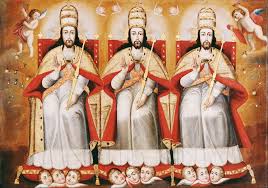
Two things every American Christian needs to know about what Islam actually teaches, whether it be the kind that beheads people or the kind that says "let's-all-just-get-along", "Islam-means-peace": Muslims believe in the need to institute Sharia Law world-wide; preferably by peaceful means (IF possible). That's the first thing. But the second is that under Sharia Law, the teaching and propagation of "associationism" becomes a crime against the state; it is "shirk" according to Islamic law, and to Muslims, the Trinity doctrine is shirk.
Shirk, or associationism is associating "partners" to Allah. It's the equivalence of polytheism (i.e. idolatry), and is to them, the unforgivable sin. In Islam, God (as in Judaism) is an indivisible unity of One. God as the Father, the Son and the Holy Ghost comes under the category of shirk.
It's unlikely Islam's founder even HEARD a biblical explanation of the Trinity, or for that matter, the Gospel ITSELF. For example, the Quran's condemnation of both condemns not the orthodox [i.e. "correct"] doctrine found in the early creeds of Christendom, but rather the distorted views of the Christian heresies circulating in Arabia in the 6th Century AD. What the Qur'an condemns, is actually something called "Tri-theism" which the early creeds of Christendom also condemn: it's the view that the three Persons of the Godhead are in fact three distinct Gods, each with an independent center of consciousness and will. Aside from that, many Muslims believe that the what Christians call the "Trinity" includes MARY as part of the God-head, due in part to her overly-prominent rule in Roman Catholic doctrine, paintings and statuary. Tritheism was an early heresy whose practitioners were banished to Arabia by the bishops of the Christian Roman Empire. What Islamic scholars have tended to do historically was to "read back" into the Qur'an the Christian-Islamic controversies that came later, including that of the Trinity.
There is a certain inconsistency in the Qur'an as to how trinitarian-believing Christians are to be treated under Sharia Law, whether harshly or not as harsh. Historically, Muslim societies have extended a certain restricted mercy, but always at the discretion (or "whim") of the ruler. Until recently, before ISIS, the Muslim Brotherhood, Boko Haram and others began wreaking havoc upon Christian communities, churches, though forbidden to practice evangelism, were tolerated by the Western-educated, business-suited rulers of the Middle East. Hafez Assad of Syria (father of his son Bashir), Saddam Hussein of Iraq, Anwar Sadat and his successor Hosni Mubarak of Egypt, though all practicing Muslims, were nonetheless perceived by the "Arab street" to be too pro-Western and too anti-Muslim. Indeed, according to the Qur'an, they should've restricted the Christians even more than they did, especially towards belief concerning the "shirk". But Assad, Hussein and Mubarak were largely pragmatic men, not zealots; and simply wanted to stay in power with a stable government.
Once you understand the scriptural basis for the Trinity, if you ever have a religious dialog with a Muslim friend or neighbor, try saying this: "I understand what Mohammad was so offended at regarding the Trinity. You know, as an informed Christian, I'd be offended too." That'll open up your witnessing discussion quite a bit.
Shirk, or associationism is associating "partners" to Allah. It's the equivalence of polytheism (i.e. idolatry), and is to them, the unforgivable sin. In Islam, God (as in Judaism) is an indivisible unity of One. God as the Father, the Son and the Holy Ghost comes under the category of shirk.
It's unlikely Islam's founder even HEARD a biblical explanation of the Trinity, or for that matter, the Gospel ITSELF. For example, the Quran's condemnation of both condemns not the orthodox [i.e. "correct"] doctrine found in the early creeds of Christendom, but rather the distorted views of the Christian heresies circulating in Arabia in the 6th Century AD. What the Qur'an condemns, is actually something called "Tri-theism" which the early creeds of Christendom also condemn: it's the view that the three Persons of the Godhead are in fact three distinct Gods, each with an independent center of consciousness and will. Aside from that, many Muslims believe that the what Christians call the "Trinity" includes MARY as part of the God-head, due in part to her overly-prominent rule in Roman Catholic doctrine, paintings and statuary. Tritheism was an early heresy whose practitioners were banished to Arabia by the bishops of the Christian Roman Empire. What Islamic scholars have tended to do historically was to "read back" into the Qur'an the Christian-Islamic controversies that came later, including that of the Trinity.
There is a certain inconsistency in the Qur'an as to how trinitarian-believing Christians are to be treated under Sharia Law, whether harshly or not as harsh. Historically, Muslim societies have extended a certain restricted mercy, but always at the discretion (or "whim") of the ruler. Until recently, before ISIS, the Muslim Brotherhood, Boko Haram and others began wreaking havoc upon Christian communities, churches, though forbidden to practice evangelism, were tolerated by the Western-educated, business-suited rulers of the Middle East. Hafez Assad of Syria (father of his son Bashir), Saddam Hussein of Iraq, Anwar Sadat and his successor Hosni Mubarak of Egypt, though all practicing Muslims, were nonetheless perceived by the "Arab street" to be too pro-Western and too anti-Muslim. Indeed, according to the Qur'an, they should've restricted the Christians even more than they did, especially towards belief concerning the "shirk". But Assad, Hussein and Mubarak were largely pragmatic men, not zealots; and simply wanted to stay in power with a stable government.
Once you understand the scriptural basis for the Trinity, if you ever have a religious dialog with a Muslim friend or neighbor, try saying this: "I understand what Mohammad was so offended at regarding the Trinity. You know, as an informed Christian, I'd be offended too." That'll open up your witnessing discussion quite a bit.
